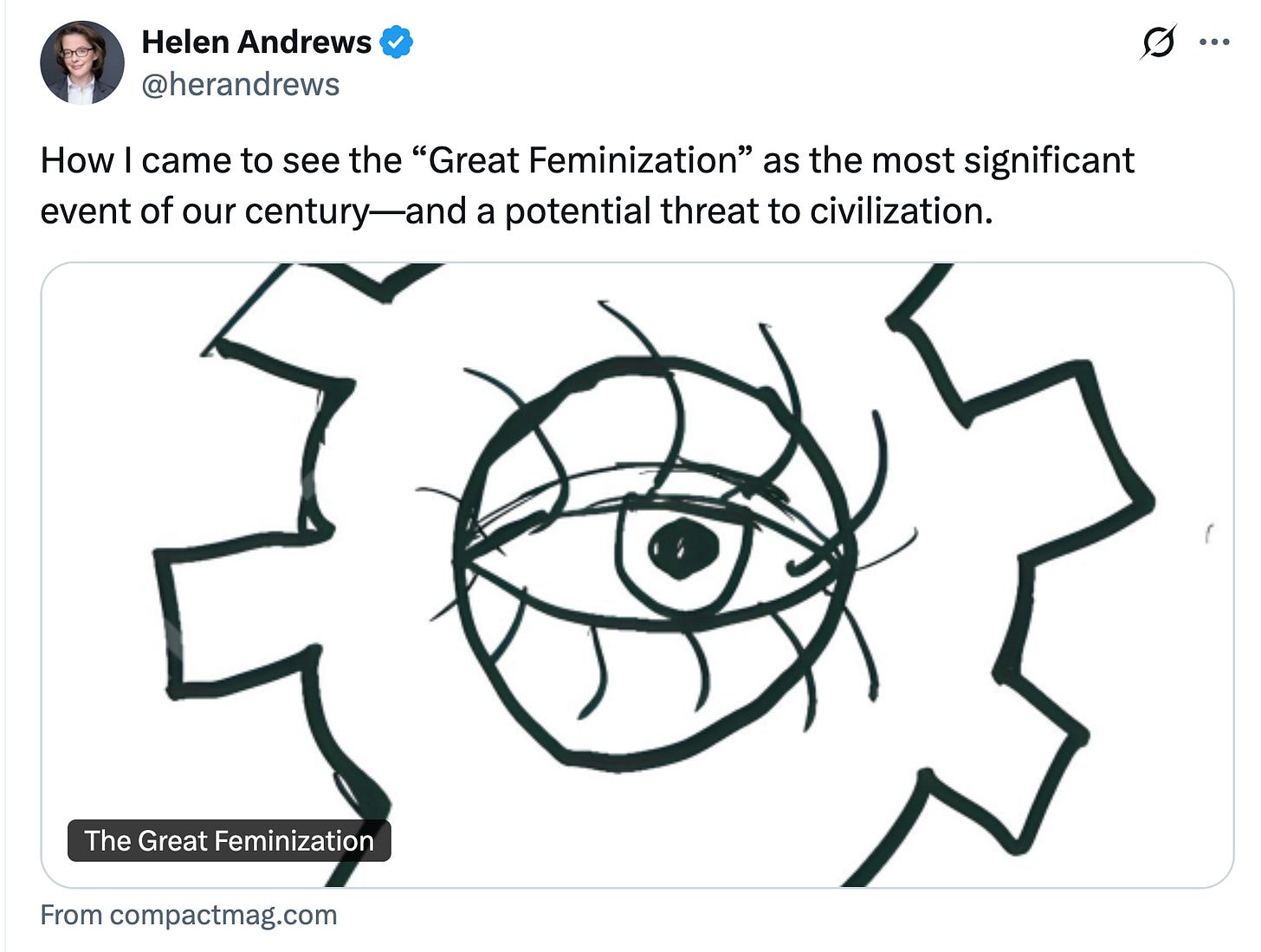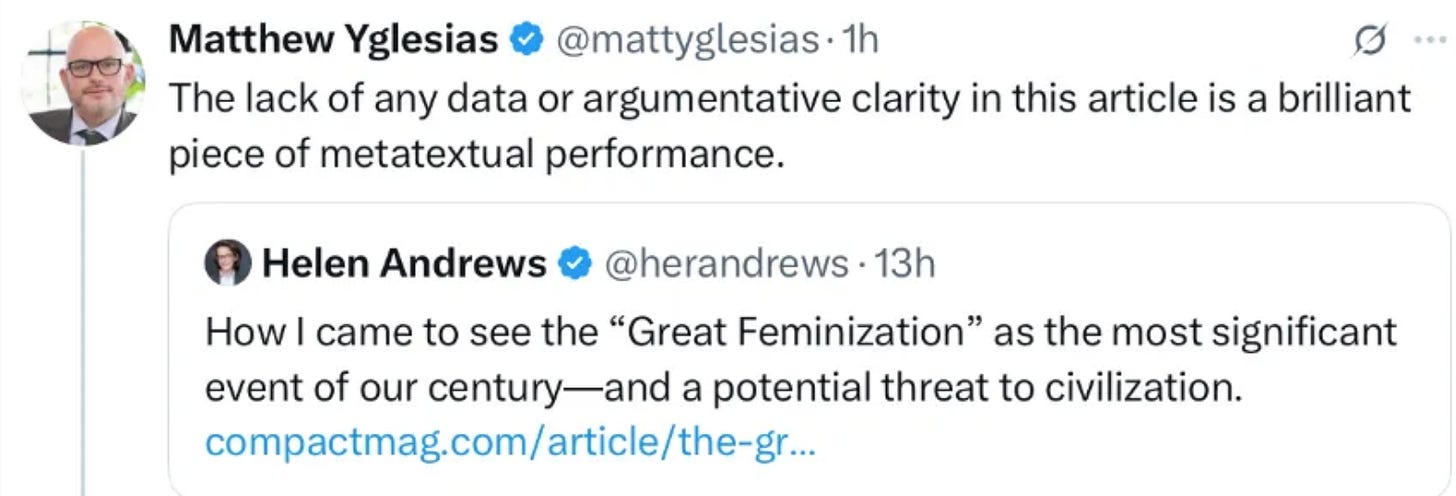Are women unsuited for the pursuit of truth?
Yes. But so are men.
A friend sent me The Great Feminization, where Helen Andrews argues that the rise of women in certain fields will have terrible consequences.
It’s a brisk and well-written article, with two simple ideas: First, women are too woke: “Everything you think of as wokeness involves prioritizing the feminine over the masculine: empathy over rationality, safety over risk, cohesion over competition.” Second, as women come to dominate law, business, and academia, these cultures will become more woke, with disastrous results. Regarding academia, Andrews writes:
The problem is not that women are less talented than men or even that female modes of interaction are inferior in any objective sense. The problem is that female modes of interaction are not well suited to accomplishing the goals of many major institutions. You can have an academia that is majority female, but it will be (as majority-female departments in today’s universities already are) oriented toward other goals than open debate and the unfettered pursuit of truth. And if your academia doesn’t pursue truth, what good is it?
Andrews’ piece has not received a gentle reception. Matthew Yglesias’ reaction was typical.
Other critiques come from David French, Richard Hanania, Audrey Horne, and Phoebe Maltz Bovy. One point that commentators have made is that it’s pretty bizarre right now to see the main threat to fields like academia and law as coming from empathetic women. They’re not the ones who are attacking the universities, slashing scientific funding, trying to throw dissenters in prison, and supporting crackpot theories of autism. As Hanania puts it,
Half the political spectrum has completely rejected feminization, as can be seen in their support for Donald Trump, a walking repudiation of everything that the schoolmarm culture represents. Over 80% of Republican members of Congress are men, and Fox News famously treats women as eye candy. In 2024, the Trump coalition became even more male-coded, bringing in outspoken Silicon Valley billionaires and the bro podcast sphere. Did this masculinization of the movement lead to more concern with truth?
My own take is that the article gets some things right, but isn’t radical enough in its conclusion. I agree with Andrews that “female modes of interaction” are not optimal for the pursuit of truth. What she misses is that male modes of interaction are also non-optimal and might even be worse.
One interesting thing about the critical reaction to Andrews’ article is that everyone (or at least everyone I’ve read) accepts her premise that there exist sex differences. There is a male style of being (aggressive, argumentative, shit-disturbing) and a female style of being (nurturant, comforting, tend-and-befriend—to use the term from the psychologist Shelley Taylor). On average, men are more likely to hew to the male style, and women are more likely to hew to the female style. If you overhear someone say, “But, look, from an economic point of view, we shouldn’t be so quick to condemn slavery”, odds are that the speaker is a dude. And, as Andrews points out, the dynamics of female-dominated groups tend to be different from those in male-dominated groups—more support, less chest-thumping.1
Because of this, the increased proportion of women in academia is likely to affect its culture. Men and women have, on average, different attitudes about what matters in higher education (see here for a good recent review). One survey found that 71% of undergraduate men reported that protecting free speech is more important than promoting inclusivity, while 59% of undergraduate women reported the opposite intuition, favoring inclusivity over free speech. Several other surveys, including those of professors, find similar differences.
Citing this work, Andrews writes:
Female modes of interaction are not well-suited to accomplishing the goals of … open debate and the unfettered pursuit of truth.
Like I said, I think she’s right. The relative lack of concern about free speech is one problem. As another, consider academic talks. There is a style in female-dominated fields, such as developmental psychology, where every question begins with a compliment, and it’s considered bad manners to point out a flaw in a study or a hole in an argument. This is not conducive to scholarly progress.
Is there anything as bad as female modes of interaction for the pursuit of truth? I can think of one—male modes of interaction.
I’ve been to talks in male-dominated fields (such as, until relatively recently, philosophy) where it was all status competition, with top prize going to the questioner who eviscerates the speaker with the most savage question. This is disastrous for the pursuit of truth—it discourages the brilliant but timid from participating; it favors verbal dexterity over thoughtful reflection; it rewards dishonesty (God help the speaker who admits a weakness in his argument), and it shuts down the possibility for collaboration.
As another example, the replication crisis in psychology and other fields is in large part the product of scholars rushing to impress their peers, to show off how successful and intelligent they are. When you think of such people, do you really think of empathetic feminists?
Here is one of the great frauds of psychology, Diederik Stapel, explaining why he started to fake his data:
At conferences, I was still in the small-to-medium rooms off to one side. I’d never been invited to be the keynote speaker. I was bored. I wanted to come up with a line of research that everyone would want to follow. ... I wanted to do something really important and sensational, to really make a contribution. I wanted to be one of the stars.
Maybe there are worse things than being woke?
One of my favorite books is The Scout Mindset by Julia Galef. In it, Galef explores what it is to cultivate an honest and objective way of seeking out the truth. One should adopt what she calls a scout mindset.
[This] is what allows you to recognize when you are wrong, to seek out your blind spots, to test your assumptions and change course. It’s what prompts you to honestly ask yourself questions like “Was I at fault in that argument?” or “Is this risk worth it?” or “How would I react if someone from the other political party did the same thing?”
Does the scout mindset naturally follow from the stereotypical female mode of thinking and interacting? No. There is a lot to be said about caring about social harmony and inclusivity, but it’s a lousy way to come to the truth, particularly when the truth is complicated and hurtful.
Does it naturally follow from the stereotypical male mode of thinking and interacting? Hell, no. Indeed, Galef explicitly contrasts the scout mindset with what she calls the soldier mindset—a mode of reasoning based on a model of combat. From this perspective:
Arguments are either forms of attack or forms of defense. If we’re not careful, someone might poke holes in our logic or shoot down our ideas. We might encounter a knock-down argument against something we believe. Our positions might get challenged, destroyed, undermined, or weakened. So we look for evidence to support, bolster, or buttress our position. Over time, our views become reinforced, fortified, and cemented. And we become entrenched in our beliefs, like soldiers holed up in a trench, safe from the enemy’s volleys.
And if we do change our minds? That’s surrender. If a fact is inescapable, we might admit, grant, or allow it, as if we’re letting it inside our walls. If we realize our position is indefensible, we might abandon it, give it up, or concede a point, as if we’re ceding ground in a battle.
Galef convincingly argues that this soldier mindset is a terrible way to arrive at the truth. It is also a very male way to think.2
While Andrews never uses the term, it’s clear that her own model for rational inquiry is much the same as Galef’s scout mindset. So I do accept her argument that the stereotypical female style doesn't fit well with this. What she misses is that the stereotypical male style isn’t any better, and so feminization isn’t the threat she thinks it is.
I sometimes hear that the perfect world—in academia, law, and business—is a combination of the male and female styles, keeping the best of both. I used to believe this too, but now I think it’s wrong. We’ll do best when we think in ways that don’t fall into these common and socially reinforced ways of being. We’ll do our best not as women and not as men, but as scouts.3
To qualify this a bit, these generalizations might not hold for people in powerful positions, since attaining such positions requires a high level of stereotypically male traits, most notably ambition. People who expect female Nobel prize winners, Ivy League profs, Supreme Court justices, and world leaders to be empathetic fluff balls are going to be surprised. So when women rule the world, things might not be all that different. (Good news for those like Andrews who worry about “feminization”; bad news for the rest of us.)
More generally, Richard Hanania points out that the sort of rational argumentation that Andrews admires actually isn’t all that stereotypically male: “To even sit down and talk about political issues using facts and reason probably seems unmanly from certain cultural perspectives. That’s why young boys who read books are often picked on as nerds, despite Andrews holding them up as paragons of masculinity.”
Thanks to Jennifer Senior, Azim Shariff, and Christina Starmans for discussions of these issues.





I like Galef’s work, but I think she focuses too much on individual level solutions. It would be nice if each individual were optimally truth-seeking on their own. But if most people have one or another mindset that isn’t optimal for truth-seeking, it seems to me to be better to design social systems to enable these individual mindsets to work well collectively. I think this is what Adam Smith says about capitalism, and Philip Kitcher and Michael Strevens say about science, and Elinor Ostrom about traditional management of collective pool resources.
Thanks, Paul. This is the best take I’ve seen on this topic. One idea I would add: both the stereotypically male and female styles have characteristic strengths and weaknesses, not only in truth-seeking, but in other areas like parenting or cooperation. Under this view, there are healthy or virtuous ways to be characteristically male (e.g. brave, independent, principled), as well as unhealthy or "toxic" ways to be male (vengeful, domineering, aggressive). The same holds for femininity. In fact, one of the simplest ways to understand wokeness is that it provides benefit where it promotes stereotypically feminine virtues like empathy and caring, but causes problems when it enables unhealthy manifestations of these qualities, such as gossip, social exclusion, selective empathy, or mama bear aggression. This is also the simplest lens to understand the MAGA movement – it's a very unhealthy version of masculine behavior, lacking the male virtues.